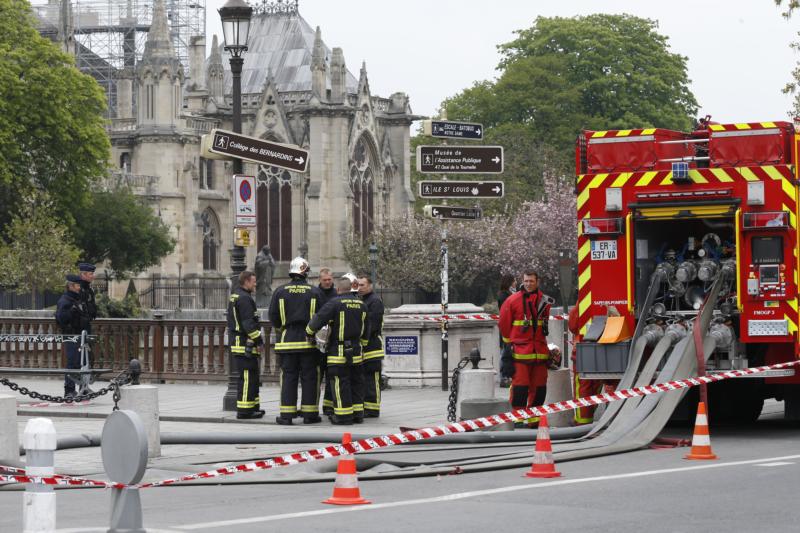
Firefighters are seen in front of Notre Dame Cathedral April 16, 2019, after a fire broke out in Paris. Officials said the cause was not clear, but that the April 15 fire could be linked to renovation work. (CNS photo/Paul Haring)
LOS ANGELES (CNS) — It was in the car somewhere between Santa Barbara and downtown Los Angeles that Auxiliary Bishop Robert E. Barron got the news that the legendary Notre Dame Cathedral in Paris had caught fire.
Minutes later, he was already on a phone interview with MSNBC, explaining the Gothic landmark’s significance and his own personal connection to it.
“It is heartrending,” Bishop Barron said in an interview with Angelus News of the Los Angeles Archdiocese just before the chrism Mass at the Cathedral of Our Lady of the Angels April 15.
[hotblock]
As a young priest studying for a doctorate in theology at the Institut Catholique de Paris, Bishop Barron spent three years in the French capital and lived blocks away from Notre Dame. He even gave tours of the cathedral to English speakers.
“Notre Dame just meant the world to me,” he said. “I went there practically every day when I first moved to Paris, so I feel a very personal connection.”
The bishop admitted he could not “bring myself to see what it’s like now,” adding that “it’s a real personal loss for me.”
Bishop Barron explained that he has a particular attachment to the cathedral’s north rose window, which he calls a “very important and powerful spiritual symbol” for him.
“I’ve used it in almost all my books, and I talk about it all the time in a spiritual context. These are windows that St. Thomas Aquinas knew and St. Bonaventure knew.”
It was not immediately clear after the fire was extinguished how the cathedral’s three famous rose windows had fared in the 15-hour blaze.
Bishop Barron also noted while the rest of the world mourned the disturbing images, young Parisians were singing hymns to the cathedral’s patroness, Mary.
“I just think of Our Lady of Sorrows, Mary accompanying Jesus to the cross — especially on Holy Week. How can you not be moved?”
Nevertheless, Bishop Barron expressed hope that in the same way the trials of Holy Week lead to the Resurrection, the tragedy might be an opportunity for God to bring life out of death.
“I can’t help but think, might it awaken within the French people and the people of Europe a deeper sense of connection to the Christian faith, the faith that made that building possible?” Bishop Barron wondered aloud. “Will the loss of it awaken in people a reappreciation of the faith? My hope is yes.”
***
Kay is editor of Angelus, the news outlet of the Archdiocese of Los Angeles.
PREVIOUS: Fordham University senior dies after fall from bell tower on campus
NEXT: Catholic leaders nationwide react to Notre Dame cathedral fire



Share this story